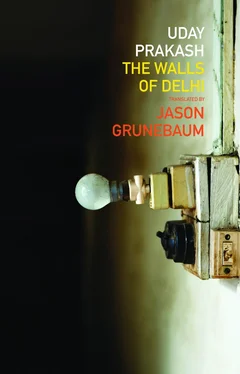As she sat groaning and washing off her blood and the spit and semen of the contractor, inspector, and Ramakant, she had the feeling that at four in the morning she had been ogled by the eyes of many men in the darkness from across the bylane. Bloodletting, blood-soaked, bestial violence: these people stayed up all night to watch this? Not a wink of sleep, smelling the shit from the sewage all night long? This was their idea of fun?
Almost a week later, the contractor showed up one afternoon in his car. The inspector was with him. They brought all sorts of goodies for Shobha: saris with matching tops, lingerie, teddies, lace panties, salwar-kurta, bangles, jewellery, and more. The contractor seemed very pleased and, between sips of chai, informed her that he had appointed her Director of the All-Women’s Welfare Association, meaning that now he would take her with him on tour to Mumbai, Nagpur, Pune, Kolhapur, and other cities.
That day, Chandrakant, a servant in the contractor’s employ, was introduced to Shobha.
Six weeks later, at a government rest house in Jalgaon, the contractor took her to the VIP room. There, party underway, Shobha slipped out under the pretext of needing to change her clothes and, bag packed with everything she had, ran off with Chandrakant to Delhi, where they rented a ground floor flat for five hundred rupees a month at house number E-3/1, bylane number seven, Jahangirpuri. He found part-time work as a helper at a department store in Vijaynagar and she began making food and snacks and pickle and preserves for neighbouring households.
Fleeing from Jalgaon with Chandrakant that night had rescued Shobha from a terrible crime; Chandrakant had masterminded the escape. Fifteen days had passed since the last party, when the contractor had announced they were going to Jalgaon. He had been busy with some construction project. Only the inspector had come in the meantime, two or three times. Shobha waited quietly for the next party, for which she had purchased thirteen rupees worth of rat poison kept hidden in her secret bundle. She mixed it into the goatmeat dish, and was ready to serve it to the inspector, contractor, and her husband, Ramakant. After she did, Shobha faced a dilemma: eat it and herself perish, or don’t eat it and run off with Chandrakant? She kept her plan hidden from Chandrakant; he seemed so guileless and honest that she was sure he would never allow her to go through with it. Chandrakant finally acceded to them running away together from Jalgaon, though he was clearly scared. SHOBHBA IN THE HALF FLAT
E-3/1 was a four-story house. There was space underneath the stairs that, with a little imagination, formed something like a room. Ten feet long, seven feet wide, not exactly a room, but a half flat, and thus with no proper front door. Chandrakant and Shobha fastened two planks of wood over the opening. The first they nailed to the top with scrap metal and hung a blue plastic curtain. The second served as a sliding door leaf. On cold winter days when both Chandrakant and Shobha went out, they kept the door closed. In front of the door, or wall, or board, or whatever you want to call it, was an additional space that measured about four-and-a-half feet. On the left side was a little tap where Shobha and Chandrakant did all their bathing, laundry, and dishes. They called it ‘the balcony’; two feet below was an open sewer. A strong, sour smell continuously wafted upwards along with a buzzing swarm of flies. A few days ago Chandrakant had found another board to cover it up.
They slept on a coarse little mat spread on the floor of their half flat, which they called, in English, the ‘room.’ Chandrakant and Shobha also owned a banged-up tin trunk in which they kept items used infrequently. Also kept in the trunk were the bangles, jewellery, saris, and salwars from the inspector and contractor; stainless steel and glass pots and plates from her parents when she got married; a pair of silver anklets; her mangalsutra wedding thread; a toe ring; armlet; a sari of silver thread. A half-inch strip of plywood was fastened above the trunk, on top of which perched the household’s most valuable and necessary item, a fan. It was because of the fan they were able to sleep in the heat, without harassment from flies and mosquitoes. When it went on the blink, the despondent pair would go out to fetch the electrician and wouldn’t rest until he’d fixed it. But it rarely stopped working. Flip the switch and it purred to life with a loud whoosh. The strong flow of cool air made Chandrakant and Shobha very happy.
In the corner of the room was a little stove that ran on wood scraps. That’s where Shobha cooked, and no food was more delicious than Shobha’s. He had been hooked on Shobha’s cooking since the days of Sarni when he went in the big car to the parties at Ramakant’s with his boss, the contractor. He used to pull right up to the door, making it a little difficult for the passersby who liked to peer inside the house. The contractor would turn up the tape deck as loud as it would go, drowning out both the noise of the ‘party’ and the shrieks of Shobha. Chandrakant was right there, stretched out in the back of the car, listening to the music issuing from its sound system. He had no idea what was going on inside. He never even peeked.
His eyes opened to find Shobha banging on the car window. She brought him food, a thali with roti, meat curry, onions, and more, sometimes a bit of rice. He liked her meat curry so much that it seemed there was never enough. This happened two or three times; Shobha began to sense his fondness, maybe because the two were around the same age. This was thirty years ago, when Shobha was nineteen or twenty, and villagers didn’t pay attention to age differences between bride and groom. Ramakant was between thirty and thirty-five. The inspector who those days raped Shobha daily couldn’t have been younger than forty-five, and the contractor, boss of servant Chandrakant, must have been nearing sixty.
Chandrakant, a young man of nineteen, was utterly different from these middle-aged, savage, stinking men; he stretched out in the back of the car, eyes closed, quietly listening to music, never asking for seconds, never taking a peek inside the house to see what went on during the ‘party.’
That night she quietly crept to the car door window and, peering inside, saw Chandrakant mopping up the last of meat sauce with a roti, two more still on his thali.
‘Do you want some more meat and sauce?’ she asked, startling Chandrakant.
‘No, no, this is plenty!’
Shobha met his reply with a smile. ‘Then what’s the use of the other roti?’
Chandrakant didn’t have an answer.
She brought another katori dish full of meat and sauce, and two more roti as well. It pleased her as Chandrakant silently took the bread and lowered his head to begin eating. She watched him as he ate. He suddenly lifted up his head: his hair was a mess, his mouth full of food. He stared at Shobha and blushed as he broke into a kind of giggle.
It was like the end of a lifesaving rope that dangled in front of the black hole of her hellish life. She decided to grab it and run away, not knowing whether it was out of love or from an intense desire to be free.
The next party, Shobha informed the inspector, contractor, and Ramakant, who were busy eating fish pakoras and drinking, that she was going outside to serve Chandrakant his food. Once there, she got in the car and told him everything. She showed him her legs, back, chest, and neck for him to examine. ‘Someone might come, I can’t show you the rest here,’ Shobha began. ‘But mark my words, one day I’ll be dead and they’ll throw my body away. Save me however you can. Take me anywhere. I’ll do your laundry, clean and dust, cook for you every day, wash the dishes. You like my meat curry, right? I can cook better. I can put a masala into the dish that’ll fill the whole house with the most unbelievable fragrance you’ve ever smelled. If you want me to sleep outside, in the courtyard, on the stoop, I will. I don’t need sheets or blankets. I can live with the clothes on my back. When you’re not making money, I’ll make it for you.’
Читать дальше










